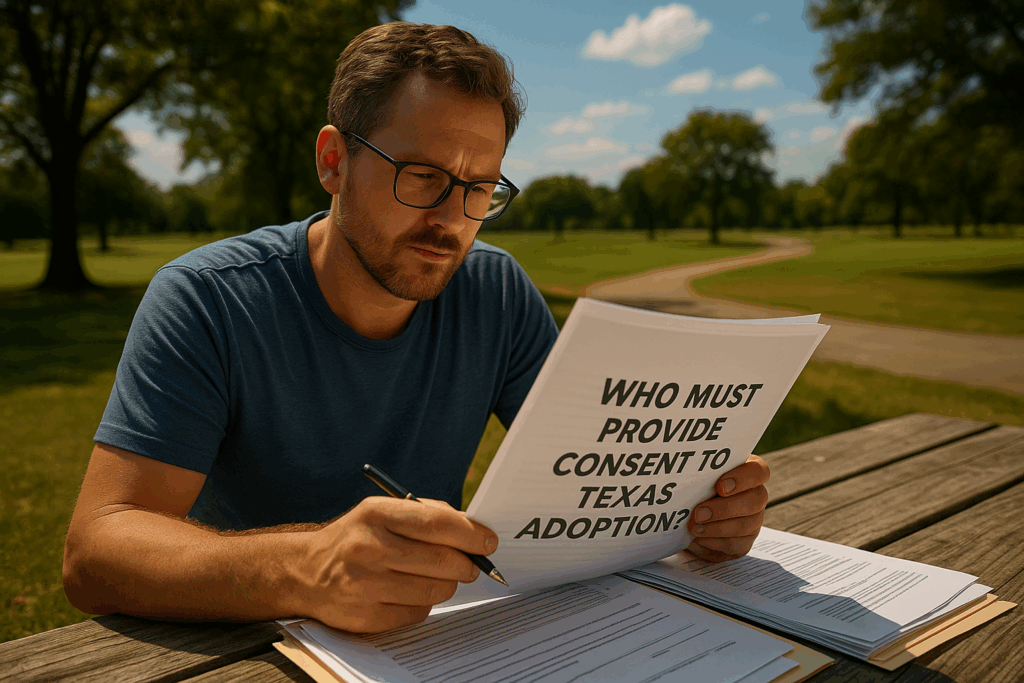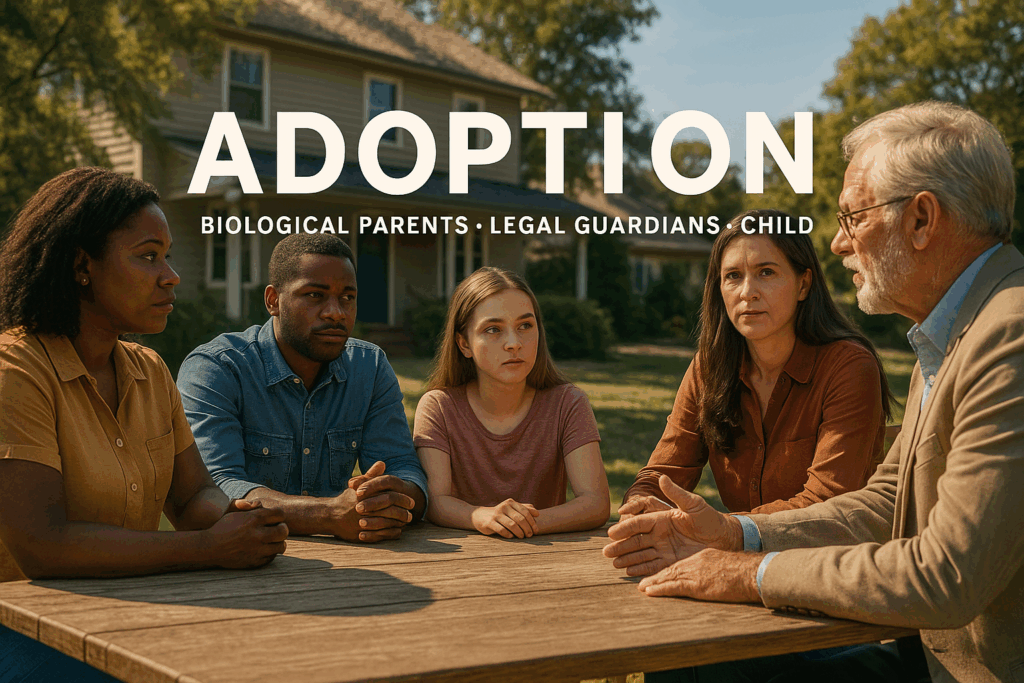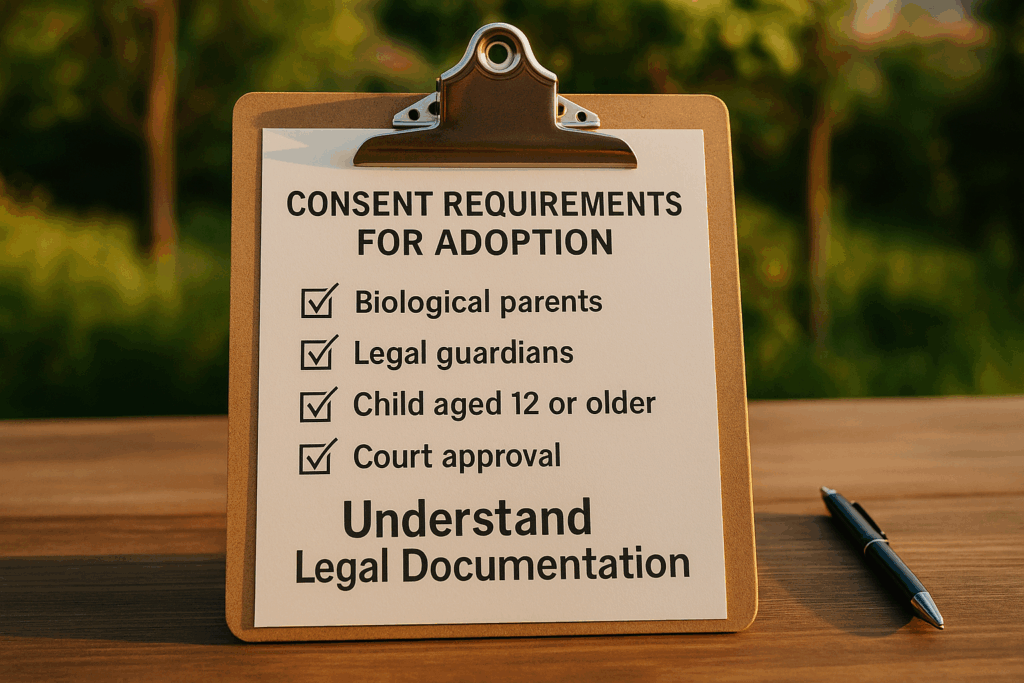
Ever find yourself staring at a mountain of adoption paperwork wondering, “Wait, who actually needs to sign off on this?” You’re not alone. In fact, one of the most common—and most crucial—questions we hear at The Law Office of Bryan Fagan, PLLC is: Who must provide consent to Texas adoption? The short answer? It depends on who’s involved—but usually, it includes biological parents, legal guardians, and sometimes even the child.
Adoption in Texas isn’t just about filling out forms and waiting for a judge’s nod. It’s a process filled with heart, legal nuance, and a few curveballs if you’re not prepared. Whether you’re a hopeful stepparent, a grandparent stepping up, or navigating the complexities of CPS or international adoptions, understanding who must give consent can make or break your journey.
So why keep reading? Because this blog unpacks everything from the legal backbone of Texas consent laws to real-life scenarios and expert tips to help you avoid costly missteps. We’ll also dive into less obvious but equally important topics—like revoking consent, what happens when a biological parent is MIA, and how courts protect children’s best interests throughout it all.
If you’re looking to adopt in Texas and want to protect your future—and your family’s—this guide is your first step. At The Law Office of Bryan Fagan, PLLC, we believe knowledge is power, and we’re here to make the process clearer, smoother, and a whole lot less stressful. Let’s get into it.
Key Takeaways
- In Texas, both biological parents must generally provide consent for adoption, unless their parental rights have been terminated.
- Legal guardians and children aged 12 or older also require consent, which is formalized through legal processes to ensure compliance with state laws.
- Navigating the adoption process can be complex; prospective adoptive parents should seek legal guidance to mitigate challenges and ensure all consent requirements are met.
Key Parties Required to Consent
The adoption process in Texas is both emotionally significant and legally detailed, requiring formal consent from specific individuals before an adoption can move forward. Knowing who must provide consent to Texas adoption is essential for adoptive families, and the law is clear: under Texas Family Code Section 162.010, consent is generally required from the child’s biological parents, any legal guardians or managing conservators, and from the child themselves if they are 12 years or older—unless the court determines that consent is not in the child’s best interest.
As the attorneys at our firm often explain, this consent isn’t just a symbolic gesture—it’s a formal, legally binding agreement governed by strict state procedures. Consent must be executed in accordance with Texas law, often requiring notarization, witnesses, and in some cases, court approval. Failing to properly secure consent from all required parties can halt or even invalidate the adoption process.
To better understand the documentation involved, we recommend reading our guide on understanding and filing Texas consent to adoption forms, which breaks down the legal forms, timelines, and responsibilities for each consenting party.
Consent is just one part of the broader adoption and custody landscape. For families navigating both adoption and conservatorship concerns, our blog on how to modify a child custody order in Texas offers additional insight into protecting the child’s best interest when legal relationships change.
At The Law Office of Bryan Fagan, PLLC, we are deeply committed to helping families navigate these complex decisions with care, clarity, and confidence. Understanding who must provide consent is a critical first step in safeguarding your adoption—and your child’s future.

Birth Parents’ Role
Birth parents play a pivotal role in the adoption process, as their voluntary biological parent’s consent is crucial. In Texas, both biological parents typically must provide consent unless their parental rights have been terminated. This consent must be formalized through a legal process, ensuring it is given freely and without coercion.
The termination of parental rights is a significant legal step that can be voluntary or involuntary termination. Voluntary termination involves biological parents agreeing to relinquish their rights, often through a court order. This step protects the child’s best interests and respects the parent’s rights of the birth parents.
In cases where one parent is absent or uncooperative, the court may intervene to terminate their rights if there are sufficient grounds, such as abandonment or inability to care for the child. This allows the adoption process to move forward without unnecessary delays while upholding legal and ethical standards.
Involving both birth parents and the birth mother in the open adoption process is crucial for maintaining the integrity of the parent-child relationship. By respecting the rights of the biological parents and ensuring their consent is obtained voluntarily, adoptive parents help create a stable and supportive environment for the child.
Legal Guardians’ Responsibility
Legal guardians play a critical role in the adoption process, especially when they hold custody of the child. Their consent as a legal guardian is necessary to ensure the adoption can proceed without legal complications. This consent must be provided through a formal legal process, often involving the submission of signed consent forms.
A legal guardian’s consent significantly impacts the adoption process, especially in any suit affecting the child’s future. Without their approval, the adoption may face significant delays or may not proceed at all. This highlights the importance of obtaining consent from all parties with legal standing in the child’s life.
Legal guardians must navigate the complexities of the consent process with the help of experienced legal professionals. This ensures that all legal requirements are met and that the adoption process adheres to Texas state laws. Providing the necessary documentation and following legal steps facilitates a smooth transition for the child into their new adoptive family.
Child’s Consent
In Texas, children aged 12 or older must provide written consent for adoption, underscoring the importance of the child’s involvement and ensuring their wishes are considered.
However, the court waives this requirement if it deems obtaining the child’s consent is not in their best interest. This may occur if the child is unable to provide consent due to certain circumstances or if their refusal would negatively impact their well-being.
The requirement for a child’s consent is particularly relevant in stepparent adoptions, where the child’s relationship with the prospective adoptive parent is a key consideration. Ensuring the child’s consent is obtained voluntarily and without undue influence maintains the integrity of the adoption process and fosters a positive parent-child relationship.
Situations Involving Absent or Uncooperative Biological Parents
Adoption in Texas can become legally complicated when one or both biological parents are absent or uncooperative. Understanding who must provide consent to Texas adoption is crucial, as consent is typically required from both biological parents under Texas Family Code Section 162.010. However, when a parent is unwilling or unable to provide that consent, the court may intervene—especially if there are grounds for terminating parental rights under Section 161.001.
If a parent cannot be located despite diligent efforts, or if they’ve abandoned the child, the court can waive their consent by legally terminating their parental rights. Similarly, if a biological parent is incarcerated or fails to maintain a safe and supportive relationship with the child, the court may find that proceeding with the adoption serves the child’s best interests. These determinations require thorough legal documentation and compelling evidence.
In cases where a biological parent actively refuses to consent, the court may still move forward—if there is clear proof of neglect, abuse, or inability to parent. Navigating this process can be emotionally taxing and legally complex, which is why working with an experienced Texas family law attorney is critical to building a strong case and ensuring that all statutory requirements are met.
For more insight, visit our resource on what to do if the other parent won’t consent to stepchild adoption. You can also learn about termination of parental rights in Texas, a process that often intersects with adoption. At The Law Office of Bryan Fagan, PLLC, our team is here to help you navigate every step with confidence and care, ensuring your family’s future is protected.

Stepparent Adoptions: Navigating Consent Requirements
Stepparent adoption in Texas offers families a meaningful path to legal unity, but it requires careful compliance with specific legal procedures—especially regarding consent. A central issue in determining who must provide consent to Texas adoption is the status of the non-custodial biological parent. According to Texas Family Code Section 162.010, the non-custodial parent must either voluntarily relinquish their parental rights or have them legally terminated before a stepparent can adopt. This is typically done through a signed, notarized affidavit of voluntary relinquishment, which must be executed without coercion and in accordance with state law.
Once consent is given and the termination of parental rights is finalized, the stepparent may proceed with the adoption process. In most cases, if the stepparent is not already the managing conservator, that person’s consent may also be required. Additionally, under the same section of the Family Code, children aged 12 or older must provide written consent to the adoption unless the court finds that such consent is not in the child’s best interest. These layers of consent help ensure the adoption is fully informed, voluntary, and aligned with the child’s welfare.
Stepparents are also required to attend the final adoption hearing with their spouse and, when applicable, the child. This court appearance allows the judge to confirm that all statutory requirements have been met and that the adoption serves the best interests of the child. For a deeper dive into how this process works, we recommend reviewing our step-by-step guide on how stepparent adoption works in Texas, which outlines the legal expectations, timelines, and common challenges.
To better understand how adoption intersects with other areas of family law, such as custody and support, you can also explore our article on how to modify a child custody order in Texas. At The Law Office of Bryan Fagan, PLLC, our attorneys take pride in guiding families through every step of the stepparent adoption process with a blend of legal precision and compassionate care—ensuring your growing family is protected under Texas law.

Grandparent and Agency Adoptions: Obtaining Necessary Consents
Grandparent and agency adoptions in Texas present unique opportunities to provide stability and love for children in need of permanent homes—but they also require strict compliance with legal consent requirements. Understanding who must provide consent to Texas adoption is especially important in these cases, as outlined under Texas Family Code Section 162.010. Whether it’s a grandparent stepping in due to unforeseen family circumstances or an agency working on behalf of a child in state custody, obtaining proper legal consent is a crucial step toward finalizing the adoption.
In grandparent adoptions, the prospective adoptive grandparents must demonstrate that they can offer a safe, supportive, and nurturing environment. This includes filing a formal petition, undergoing a home study, and passing background checks. Once the court finalizes the adoption, grandparents receive full parental rights and responsibilities, legally equal to those of biological parents. Consent from the child’s living biological parents or legal guardians is usually required, unless their rights have been previously terminated. These cases must meet high standards to ensure the child’s best interests are protected.
Agency adoptions, facilitated by licensed adoption agencies, follow a more formalized and highly regulated structure. The agency is typically responsible for securing all necessary consents from biological parents, guardians, and in some cases, the child. Their involvement not only simplifies the process but also ensures full compliance with Texas adoption laws. Compared to independent adoptions, agency placements are often better supported through counseling services, legal oversight, and post-placement follow-up.
If you’re a grandparent or stepparent exploring adoption, our firm provides tailored support through every step of the process. Learn more about stepparent adoption services in Texas to see how our team can help. You may also want to review our blog post on how adoption affects parental rights for deeper insight into the legal transitions involved. At The Law Office of Bryan Fagan, PLLC, we’re committed to helping families navigate these life-changing decisions with compassion, precision, and an unwavering focus on protecting each child’s future.

The Role of a Texas Family Law Attorney
Navigating the complexities of the Texas adoption process can be daunting without the guidance of a knowledgeable family law attorney. These legal professionals ensure all legal standards are met and the adoption process proceeds smoothly. From representing clients in court to drafting and reviewing legal documents, attorneys provide invaluable support throughout the adoption journey.
Family law attorneys are particularly adept at handling complications during the adoption process, such as disputes over parental rights. Their expertise in adoption law and Texas adoption laws allows them to guide clients through the intricacies of legal requirements and ensure compliance at every step. This legal guidance helps avoid potential pitfalls and ensures a successful adoption.
For low-income families, resources such as Lone Star Legal Aid offer assistance with family law matters, including adoption. These services support families who may not have the financial means to hire private attorneys. Accessing these resources provides the legal guidance needed to navigate the adoption process successfully.
The role of a Texas family law attorney extends beyond legal representation. These professionals offer emotional support and practical advice, helping families manage the stress and complexities of the adoption journey. Working with an experienced attorney ensures the adoption process is handled with the utmost care and professionalism, in accordance with Texas law.
Importance of Understanding Consent Requirements
For families considering adoption, understanding who must provide consent to Texas adoption is more than a legal technicality—it’s a foundational step in building a secure and lasting parent-child relationship. Under Texas Family Code Section 162.010, specific parties must provide written consent before an adoption can proceed, including the biological parents, legal guardians, and children aged 12 or older (unless the court waives that requirement). Proper legal guidance is key to navigating these requirements and avoiding delays or disputes in the adoption process.
Consent isn’t just about paperwork—it’s about emotional readiness. During the statutory waiting period following a child’s birth, the birth parents’ willingness to consent often depends on their emotional state and level of support. That’s why, as our attorneys often emphasize, open communication and access to counseling can be just as vital as legal strategy. Ensuring that all parties understand the implications of adoption and are prepared to proceed voluntarily helps prevent later revocations and ensures the child’s best interests remain front and center.
Maintaining well-organized documentation is also essential. From affidavits of relinquishment to court filings and consent forms, every piece must align with the requirements of the Texas Family Code. Having the correct documents filed at the right time not only keeps the process on track but reduces stress for adoptive families and professionals involved.
Whether you’re adopting a child after the death of a parent or navigating stepparent adoption, we encourage you to explore our resource on navigating the process of adopting a stepchild in Texas. You may also benefit from reading our article on how adoption affects parental rights, which explains the broader legal consequences. At The Law Office of Bryan Fagan, PLLC, we are committed to helping you prepare legally and emotionally—because adoption is not just a legal act, it’s a lifelong commitment to a child’s future.

Real-Life Examples and Case Studies
Real-life examples and case studies can provide invaluable insights into the nuances of the adoption process, particularly regarding father’s consent requirements in adoption cases. One notable case involved a father who had been absent for many years. The court determined that the mother’s consent alone was sufficient for the adoption to proceed, highlighting how the law can adapt to specific circumstances.
In another scenario, a biological father contested an adoption after years of no contact. The court finds ruled against him due to his lack of established parental involvement, underscoring the importance of active participation in a child’s life. This case demonstrated how court proceedings prioritize the child’s best interests when making decisions about father’s parental rights and consent.
Stepparent adoptions often present unique challenges, especially when the non-custodial parent’s rights need to be terminated. In one case, the custodial parent was required to prove that the non-custodial parent’s rights had been legally terminated before the adoption decree could be approved. This case highlighted the critical role of legal documentation and court orders in the adoption process.
The consent of children is crucial in the adoption process. It significantly influences the decisions made during this procedure. In a recent adoption case, a child’s refusal to consent delayed the proceedings significantly, emphasizing the importance of addressing the child’s wishes and ensuring their involvement in the process. These real-life examples illustrate the complexities of the consent process and the importance of thorough legal and emotional preparation.
Additional Resources and Support
Navigating the adoption process in Texas requires access to a variety of resources and support services. Prospective adoptive parents can obtain adoption records at the district court clerk’s office or through a Texas family law attorney. These legal documents, including the adoption petition, are essential for ensuring compliance with state laws and facilitating the adoption proceedings.
The Texas Adoption Resource Exchange (TARE) and community-based support services offer invaluable assistance to families navigating adoption. These resources provide guidance on the termination of parental rights, home study completion, and navigating court procedures. By accessing these services, families can receive the support they need to successfully complete the adoption process.
Community support services are particularly beneficial for families facing complex consent requirements. These programs offer workshops, guidance, and emotional support to help families manage the legal and emotional aspects of adoption. By leveraging these resources, prospective adoptive parents can ensure that they are well-prepared for the challenges and rewards of the adoption journey and the adoption plan.
Conclusion:
Adoption in Texas is more than a legal transaction—it’s a life-changing journey filled with emotion, paperwork, and a few legal speed bumps along the way. Knowing who must provide consent to Texas adoption is a key piece of the puzzle, and having that clarity early on can save you time, stress, and heartache. Whether you’re adopting a stepchild, working with an agency, or navigating a complex situation involving absent parents or older children, understanding the legal requirements helps protect your future—and theirs.
At The Law Office of Bryan Fagan, PLLC, we know that no two adoption stories are the same. That’s why we take the time to listen, guide, and walk with you through each step with care and clarity. Our mission is rooted in protecting families and helping them build the strong, stable futures they deserve.
So if you’re ready to take that next step—or even if you’re just gathering information—know that you don’t have to figure it all out on your own. Reach out, ask questions, and let’s start shaping a smoother path forward together.
And if you’re still wondering whether Texas requires your teenager’s signature or how to handle a parent who’s gone off the grid, just remember: the law may be complex, but with the right guidance, your adoption doesn’t have to be.
Texas Adoption and Family Law FAQs
Yes, in most cases, both biological parents must consent to an adoption in Texas unless their parental rights have been legally terminated by a court.
Not usually. A stepparent adoption typically requires the biological father’s consent unless his parental rights have been terminated due to abandonment, neglect, or other qualifying legal grounds.
Lorem ipsum dolor sit amet, consectetur adipiscing elit, sed do eiusmod tempor incididunt ut labore et dolore magna aliqua. Ut enim ad minim veniam, quis nostrud exercitation ullamco laboris nisi ut aliquip ex ea commodo consequat.
Texas Family Code 162.010 outlines the legal requirements for executing a consent or relinquishment for adoption, including how and when it can be revoked and what formalities are required.
No, a single adult may adopt in Texas. The law does not require a married couple or two parents to adopt a child, as long as the adoption is in the best interest of the child.
No, adoption is permanent. Once a biological parent’s rights are terminated and the adoption is finalized, they cannot regain custody or parental rights.
Only if your biological father’s parental rights have been legally terminated. If his rights are still intact, his consent is generally required for the adoption to proceed.
No, adopted children have the same legal rights as biological children under Texas law. There is no distinction in inheritance, custody, or support rights once the adoption is finalized.
No, only a court can terminate child support. A custodial parent cannot unilaterally cancel support orders; any changes must be approved through a formal legal process.
Bryan Fagan is a Texas family law attorney with a heart for adoption—inspired not just by his legal career, but by his own family story. Growing up in Atascocita with two adopted brothers, Bryan learned early the profound meaning of chosen family. His passion for justice was sparked by John Grisham’s The Pelican Brief, and he became the first lawyer in his family, balancing night classes at South Texas College of Law while caring for his grandmother with Alzheimer’s.
Today, Bryan brings that same dedication to his practice, guiding families through adoptions, custody disputes, divorces, and complex marital agreements. A certified member of the College of the State Bar of Texas, he combines elite legal expertise with genuine empathy—drawing from his roles as a husband, father of three, and advocate for families facing false CPS allegations.
Based in Houston, Bryan is actively involved in the Houston Bar Association’s Family Law Sector and statewide family law organizations. Whether finalizing an adoption or protecting parental rights, he believes the law should reflect the deepest values of home, commitment, and love.

